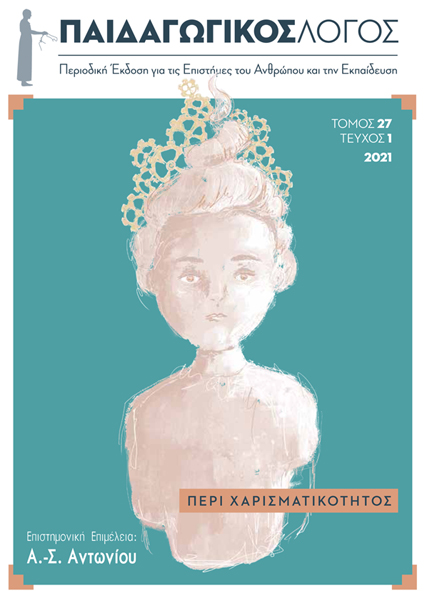Σοφία και δημιουργικότητα σε χαρισματικούς μαθητές

Περίληψη
Η σοφία αποτελεί βασικό παράγοντα προσδιορισμού των αξιακών επιλογών του ατόμου. Η σοφία και η δημιουργικότητα σχετίζονται θετικά ως έννοιες, αφού η ορθή κρίση για τα απαιτητικά προβλήματα της ζωής συνεπάγεται έναν προαπαιτούμενο βαθμό δημιουργικής σκέψης. Οι χαρισματικοί μαθητές, δεδομένης της προηγμένης ηθικής τους ανάπτυξης και ηθικής συλλογιστικής, διακρίνονται για τα υψηλά επίπεδα σοφίας και δημιουργικότητάς τους. Κατά καιρούς, οι ερευνητές έχουν αναπτύξει διάφορα μοντέλα εκπαίδευσης των χαρισματικών μαθητών, τα οποία εστιάζουν στην ανάπτυξη της σοφίας και την καλλιέργεια των ηθικών αξιών, με απώτερο σκοπό την ανάληψη ηγετικών ρόλων. Παράλληλα, έχουν σχεδιαστεί κατάλληλες διδακτικές στρατηγικές για την ενίσχυση της δημιουργικής και κριτικής σκέψης των χαρισματικών μαθητών. Πρωταρχικός στόχος των προγραμμάτων χαρισματικής εκπαίδευσης οφείλει να είναι η διαμόρφωση σοφών και ηθικών προσωπικοτήτων, οι οποίες θα μπορούν να αντιμετωπίσουν τις προκλήσεις και τα ηθικά διλήμματα που προκύπτουν τον 21ου αιώνα.
Λεπτομέρειες άρθρου
- Πώς να δημιουργήσετε Αναφορές
-
Καρανάνα Ε., Κόφα Ό., & Αντωνίου Α.-Σ. (2021). Σοφία και δημιουργικότητα σε χαρισματικούς μαθητές. Παιδαγωγικός Λόγος, 27(1), 207–226. https://doi.org/10.12681/plogos.27929
- Ενότητα
- Articles

Αυτή η εργασία είναι αδειοδοτημένη υπό το CC Αναφορά Δημιουργού – Μη Εμπορική Χρήση – Όχι Παράγωγα Έργα 4.0 4.0.
Οι Συγγραφείς που δημοσιεύουν εργασίες τους σε αυτό το περιοδικό συμφωνούν στους παρακάτω όρους:
- Οι Συγγραφείς διατηρούν τα Πνευματικά Δικαιώματα και χορηγούν στο περιοδικό το δικαίωμα της πρώτης δημοσίευσης, ενώ ταυτόχρονα τα πνευματικά δικαιώματα της εργασίας προστατεύονται σύμφωνα με την χρήση άδειας που υιοθετεί ο «Παιδαγωγικός Λόγος - Περιοδική Έκδοση για τις Επιστήμες του Ανθρώπου και την Εκπαίδευση» : Αναφορά Δημιουργού – Μη Εμπορική Χρήση – Όχι Παράγωγα Έργα 4.0 (CC BY-NC-ND). Αυτή η άδεια επιτρέπει στους άλλους να έχουν πρόσβαση στο έργο και να το μοιράζονται με άλλους, εφόσον κάνουν αναφορά σε αυτό, ωστόσο δεν μπορούν να το αλλάξουν με κανένα τρόπο ούτε να το χρησιμοποιούν για εμπορική χρήση.
- Οι συγγραφείς μπορούν να συνάπτουν ξεχωριστές και πρόσθετες συμβάσεις και συμφωνίες για τη μη αποκλειστική διανομή της εργασίας, όπως δημοσιεύτηκε στο περιοδικό αυτό (π.χ. κατάθεση σε ένα ακαδημαϊκό καταθετήριο ή δημοσίευση σε ένα βιβλίο), με την προϋπόθεση της αναγνώρισης και την αναφοράς της πρώτης δημοσίευσης σε αυτό το περιοδικό.
- Το περιοδικό επιτρέπει και ενθαρρύνει τους συγγραφείς να καταθέτουν τις εργασίες τους μέσω διαδικτύου (π.χ. σε ένα ακαδημαϊκό καταθετήριο ή στους προσωπικές τους ιστοσελίδες) πριν και μετά από τις διαδικασίες της δημοσίευσης, καθώς αυτό μπορεί να οδηγήσει σε παραγωγική ανταλλαγή ιδεών και σκέψεων, καθώς επίσης και σε γρηγορότερη και μεγαλύτερη χρήση και ευρετηρίαση της δημοσιευμένης εργασίας


